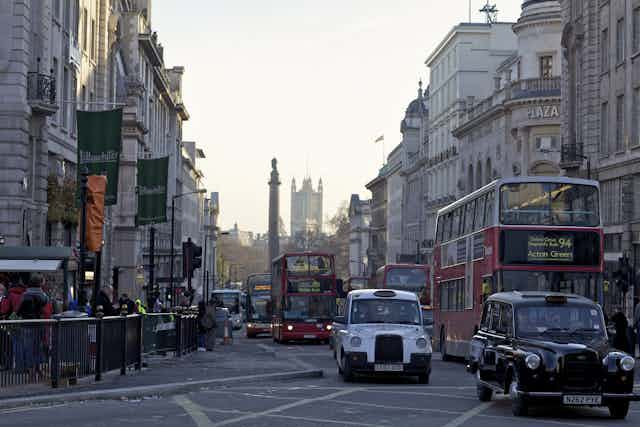Each year, nearly 9,500 people die due to London’s air pollution. It’s one of the biggest challenges for the capital’s next mayor – literally a matter of life and death.
The problem has been around for decades. In fact, this year marks the 60th anniversary of the Clean Air Act 1956, passed by parliament in response to London’s Great Smog of December 1952. London was well known for its “pea-souper” fogs, but when the “Great Smog” fell over the city the effects were unprecedented: 4,000 immediate deaths with a further 8,000 dying in the following weeks and months.
The act aimed to control domestic sources of smoke pollution by introducing smokeless zones. In these areas, coal had to be ditched in favour of smokeless alternatives such as coke or charcoal, power stations were moved to rural areas and tall chimneys were built for industry to disperse pollutant at height.

Air pollution in London is very different today, and yet the same health issues exist. Gone are the polluting factories and the coal burning and in its place are a newer breed of contaminants. One of the primary causes is the old favourite, the combustion engine. Diesel exhausts include carbon monoxide, nitrous oxides, and microscopic specs of “particulate matter”, the smaller fractions of which penetrate the deep lung and pass across into the blood stream.
All of the above are seriously bad for your health. Air pollution has been linked to cancer, asthma, stroke and heart disease, diabetes, obesity, and even dementia. The damage begins during a baby’s first weeks in the womb and continues across an entire lifetime through to old age. Consequently, any air quality improvements made now will have long-lasting benefits.
Air pollution picks on the weak and needy
The effects aren’t distributed evenly, or randomly. Older people and adults with long-term conditions are particularly vulnerable, for instance, and improving air quality will help them to stay independent and well, easing the pressure on NHS and social services.
Children are also particularly at risk, as their lungs are still developing. We know traffic-related air pollution causes asthma so, given London has more than a thousand schools close to busy roads it’s perhaps no surprise a recent poll found parents in the capital now see air pollution as the biggest health threat.
It’s a social issue too, as pollution exacerbates inequality. Research shows exposure varies a great deal from place to place even within the city, and London’s low income households tend to be in more polluted areas while wealthier people live on leafy side streets.
What the next mayor can do about it
The capital’s next mayor will have the power to make dramatic improvements to London residents’ health. Looking over the manifestos of front runners Sadiq Khan (Labour) and Zac Goldsmith (Conservative), as well as Sian Berry (Green) and Caroline Pidgeon (Liberal Democrat), it’s clear there’s a lot of agreement.
Where they differ is in their methods of dealing with these important issues and the timing of their interventions.

The Greens would bring in a smart road-charging system, while the Lib Dems would ban diesel vehicles within the city centre by 2024. Goldsmith wants to retrofit all existing buses by 2020, while Berry wants to move the entire bus fleet to hybrid/electric by that year.
Air pollution isn’t solely caused by transport, of course. Gas burning, often from domestic boilers, also adds to the problem and all candidates have ideas for reducing boiler emissions or boosting energy efficiency – Khan wants further investment in older homes, for instance. Goldsmith’s pledge that all new homes will meet the zero carbon standard would actually revive a policy the current national government has scrapped.
Of course, you have to ask, are all these policies realistic? Will they be followed through? While air quality is only one of many issues in this election, it is an extremely important one. Five decades on from the Great Smog, we need another clean air revolution.

